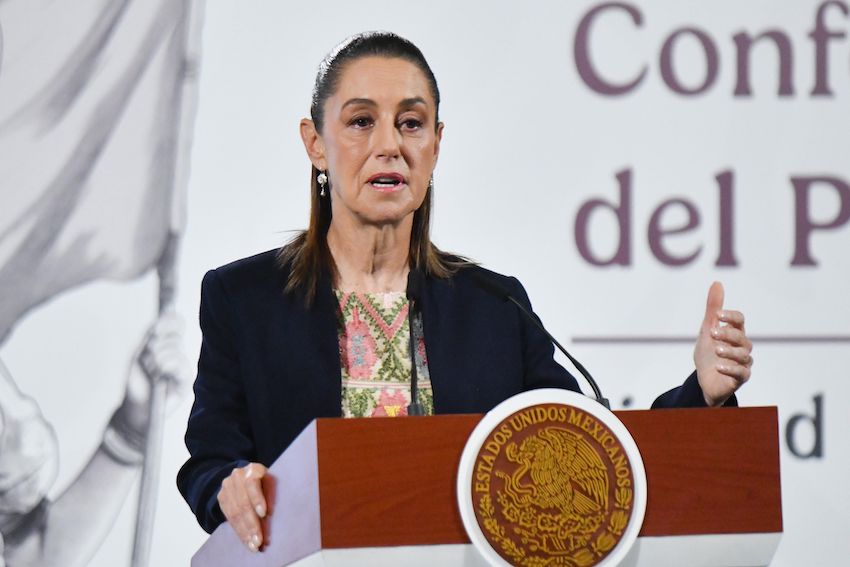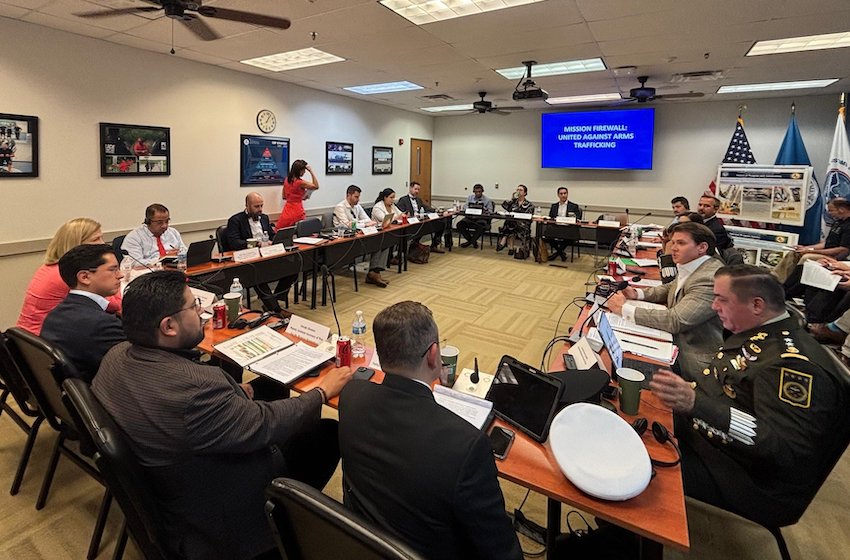Mexico and the United States announced on Saturday the launch of a new bilateral initiative aimed at disrupting the southward flow of illicit weapons across the Mexico-U.S. border.
Mexican and U.S. officials thrashed out the details of the joint project — called “Mission Firewall: United Against Firearms Trafficking Initiative” — at the inaugural meeting of the Mexico-U.S. Security Implementation Group, held last Friday in McAllen, Texas.
The establishment of the binational security group was announced earlier this month during U.S. Secretary of State Marco Rubio’s visit to Mexico.
The group is set to meet regularly to coordinate joint security actions and operations.
Mexico’s Foreign Ministry (SRE) said in a statement that the “main goals” of Mission Firewall include:
- Increasing border operations to prevent weapons from entering Mexico.
- Expanding use of the eTrace tool to strengthen firearms investigations in both countries.
- Implementing ballistic identification technology across all 32 states of Mexico.
- Strengthening information sharing between Mexican and U.S. authorities.
- Increasing investigations and prosecutions of criminal cases involving firearms.
The U.S. State Department said that the U.S. would “increase inspections and coordination with Mexico to stop the southbound flow of firearms.”
It described Mission Firewall as “an ambitious bilateral effort to combat illicit firearms trafficking through an unprecedented level of collaboration between both nations.”
Many of the hundreds of thousands of firearms smuggled annually into Mexico from the United States end up in the hands of members of notorious drug cartels. They use the weapons to commit violent crimes, including murder.
The Mexican government has long called on its U.S. counterpart to do more to stem the southward flow of weapons, and has complimented the Trump administration for heeding that message. It also sued a number of United States-based gun manufacturers and distributors, accusing them of negligent business practices that have led to illegal arms trafficking and deaths in Mexico. The United States Supreme Court threw out Mexico’s US $10 billion lawsuit in June, but the Mexican government has continued to push U.S. authorities to crack down on arms trafficking to Mexico, where guns are only sold legally at two army-run stores.

On Monday, President Claudia Sheinbaum said that for “years” the United States “didn’t accept” that the trafficking of weapons from the U.S. to Mexico was a “problem,” or “did the Fast and Furious operation [in Mexico] with the consent of the then [president Felipe] Calderón.”
Now, “for the first time, the United States recognizes that it has to do operations to control … the illegal trafficking of weapons to Mexico,” she said.
The agreement to conduct Mission Firewall is “very important,” Sheinbaum said.
The United States Ambassador to Mexico, Ron Johnson, said on social media on Saturday that “for the first time,” the U.S. and Mexico were “implementing joint inspections, real-time info-sharing, and expanded investigations to stop weapons fueling cartels.”
“… Mission Firewall marks a new chapter in U.S.–Mexico cooperation,” he wrote.
The meeting in McAllen
The meeting in McAllen, a border city opposite Reynosa, Tamaulipas, took place just over three weeks after Rubio held security talks with Sheinbaum and other Mexican officials in Mexico City. He subsequently said that the U.S. and Mexico were “amplifying” their security cooperation in order to combat organized crime groups and the narcotics they traffic on both sides of the border.
The State Department said that representatives from six U.S. government agencies and their Mexican government counterparts attended the meeting in McAllen on Friday.

The SRE said that the U.S. government reported on the progress that has already been made to stop arms trafficking to Mexico. The ministry said that U.S. officials reported that since January, the Trump administration has “opened more than 125 arms trafficking investigations, seized firearms, and identified suspected members of criminal networks involved in this crime on U.S. territory.”
At the meeting, the Mexico-U.S. Security Implementation Group also announced “the formation of a bilateral working group to combat cross-border illicit finance and cooperate on civil asset forfeiture,” according to the State Department.
It also said that “at Mexico’s request, the United States has created a first-of-its-kind secure platform to allow information sharing regarding suspicious air shipments and packages to identify and interdict illicit drugs, chemical precursors, firearms, and illicit fuels.”
The ramping up of security cooperation between Mexico and the United States comes as U.S. President Donald Trump continues to pressure the Mexican government to do more to combat cartels and stop narcotics, especially fentanyl, from reaching the U.S.
So-called “fentanyl tariffs” that Trump imposed on non-USMCA compliant imports from Mexico in March remain in effect.
Sheinbaum has said on countless occasions that her government is willing to cooperate and collaborate on security issues with its U.S. counterpart, but won’t accept subordination or any violation of its sovereignty. She revealed in May that she had declined an offer from Trump to send the U.S. army into Mexico to combat cartels, and has ruled out the possibility of the U.S. “invading” the country or bombing cartel targets.
Mexico News Daily
